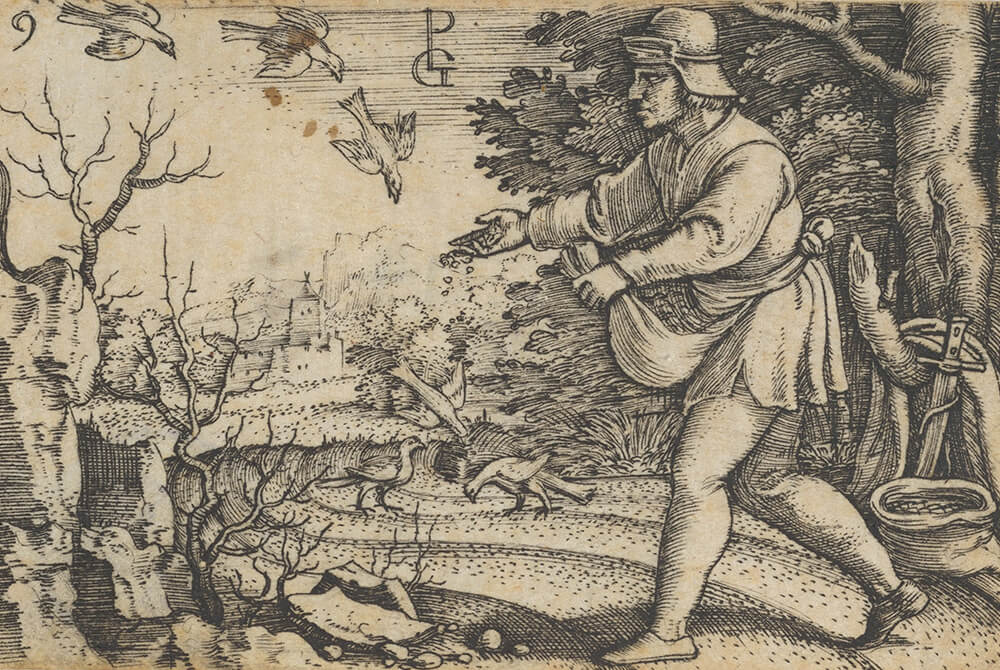
The Parable of the Sower is one of Jesus’ most extensively explained parables. Its fundamental teachings about God’s kingdom were so important that Jesus personally gathered his disciples to explain it to them in simple terms. In this article, we will carefully examine what Jesus said in this parable and its implications for church growth.
The Tale of the Types of Soil and the Seeds
And when a great multitude had gathered, and they had come to Him from every city, He spoke by a parable… Luke 8:4
At this point, having performed many miracles, Jesus had amassed a large following. With crowds gathering around Him, He proceeded to teach a parable about a man who sowed seeds in four different types of soil.
Seeds on the Wayside
According to Jesus, the seeds sown on the wayside were left exposed, making them vulnerable to being devoured by birds. This type of ground represents people who hear the word of God but lack understanding, resulting in the word remaining superficial, which Satan can quickly snatch away.
Seeds on the Stony Ground
The seeds that landed on the stony ground are like those who initially hear the word of God with joy. However, as they lack deep roots, their enthusiasm fades away quickly. When faced with the difficulties of following Jesus, they can’t endure the pressure.
These individuals may seem to follow Christ with eagerness and passion, and their growth in faith appears to be rapid. However, when the initial excitement wears off and they encounter challenges, they will abandon their faith just as fervently as they had embraced it.
Seeds Among the Thorns
The seeds that fell among the thorns were choked by the distractions of the cares of this world, riches, and pleasures in life. The issue with thorns is that they do not grow suddenly and choke the seeds right away. Thorns grow gradually when the ground is not nurtured and tended to. Similarly, in life, concerns such as career, family problems, and health issues are valid, but if we are not careful, they can consume most of our attention and stifle our faith.
Seeds On Good Ground
The seeds that landed on fertile soil grew into strong plants that produced an abundant harvest. These individuals not only received the word but also nurtured and cultivated it. Their commitment and dedication to God’s teachings led to significant growth and impact.
These are the kind of people who become catalysts for change and have a clear sense of purpose. They are the ones who experience the blessings that the psalmist describes in Psalm 1:
His delight is in the law of the Lord,
And in His law he meditates day and night.
He shall be like a tree
Planted by the rivers of water,
That brings forth its fruit in its season,
Whose leaf also shall not wither;
And whatever he does shall prosper. Psalm 1:2-3
Take Heart in the Parable of the Sower
Jesus taught this parable during the peak of His ministry when His popularity had spread, and people from different backgrounds were following Him. Despite knowing that the multitude had varying motives for following Him, He continued to teach them.
He scattered seeds wherever He could, even though He knew that only a few would take root in their hearts. This is an essential lesson for sowers to understand.
As sowers, we have two responsibilities: to receive the seeds from the Master and sow them wherever we can. That’s it. Everything else is beyond our control. When the church grasps this concept, it allows more space for the Holy Spirit to do His work of causing growth.
I planted, Apollos watered, but God gave the increase. So then neither he who plants is anything, nor he who waters, but God who gives the increase. 1 Corinthians 3: 6-9
As Christians, it’s not our responsibility to worry about how our audience will receive the Gospel. Nor is it our duty to change their hearts. These are enormous tasks that can distract us from our calling as sowers. Our only job is to sow the seeds of the Gospel as widely as possible, covering as much ground as we can.
This message may not be comforting to those who prefer to be in control. Nevertheless, it is the message of the Holy Spirit to the church: sow the seeds and then trust in Him to make them grow. Proud individuals may find this difficult to accept, but those who truly depend on God find assurance in it.
Even Jesus understood that not everyone who listened to Him would remain faithful. Nevertheless, He continued to teach and heal all who came to Him. He never turned anyone away. As Christ’s followers, we are called to do the same.
Multitudes From the 25%
Upon close reading of the parable, one may wonder if it’s a waste of seeds, as only 25% of them make it onto good ground and bear fruit. It may seem like a low return for all the effort put in.
However, the parable doesn’t end on a negative note. The 25% that did make it to good ground produced a harvest, ranging from a hundredfold to thirtyfold. Even the lowest projection, thirtyfold, gives a significant return for the sower’s efforts.
Therefore, my beloved brethren, be steadfast, immovable, always abounding in the work of the Lord, knowing that your labor is not in vain in the Lord. 1 Corinthians 15:58
These paragraphs illustrate how having the Holy Spirit guiding the ministry’s growth can be compared to the process of sowing seeds, which may not show any immediate results. Despite sharing the Gospel with people and inviting them to church or small group, there may be little response or engagement. It can be disheartening when people become distracted or don’t continue to attend services.
However, the story doesn’t end with disappointment. Rather, it ends with the promise of a harvest. The process of sowing seeds may take time, but it will eventually produce a yield. It is important to trust in the guidance of the Holy Spirit and continue to sow seeds, even when we do not see immediate results. Ultimately, the harvest will come.
A Shoutout to All the Sowers
Whether you’re a pastor, a church leader, or a new Christian, the Parable of the Sower holds significance in your life. It reveals the mysteries of the kingdom and how God works in it. To witness this, you must be an active participant.
Accept the seeds from the Master, and venture into the field — be it the church, workplace, or home — to sow them. Don’t merely watch from the stands; the field is where the harvest is found.
As you invest your time, effort, and resources into sowing, the parable ceases to be a parable. The seeds you sow into the field will generate a harvest that first emerges in your heart. This is the word of God — alive and potent.


